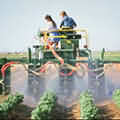|
by Elizabeth Sawin
After interviewing farmers, farm advocates, environmentalists, and policy makers, my colleagues and I have concluded that part of the answer lies in our society's definition of efficiency. The kind of efficiency that determines whether a farmer earns a profit and manages to hold on to his land is a very particular efficiency. It is the efficiency of producing just one thing -- a single crop -- with the frugal use of a few other things -- labor, land, equipment, and so forth. There is nothing in this equation about maintaining the health of the Gulf of Mexico. That is why the Gulf of Mexico has a Dead Zone and why that Dead Zone is growing.
It doesn't have to be this way. There is nothing in our current definition of efficiency that is a natural law. We could reorient our thinking to expand what we reward. We could begin to think of clean water and healthy soil the way we think of wheat and barley -- as products of farming. Many European countries have done just that; they hold farmers responsible for water purification and biodiversity as well as crops, and offer payments for these kinds of productivity.
In addition to expanding what outcomes we reward, we could expand the list of things we want our farmers to be frugal with. There is a clear economic incentive to be frugal with labor and capital; why not also with soil, water, and community quality of life? Getting our markets to work for us requires figuring out how to reward the careful use of these resources.

Misting the point: spraying with diswashing detergent and cooking oil.(Photo: USDA.)
It's not that we lack the policy instruments. Economists already have a toolbox full of suggestions, from stewardship payments to pollution taxes, to encourage ecologically friendly agricultural practices. But we won't make use of these tools until we stop expecting that competition on a narrow definition of efficiency can somehow deliver broader goals. That is like a university selecting its first-year class based only on SAT scores and then expecting the students to excel at football and chamber music.
These are not things to be left up to chance. If you want football and music -- or healthy water and thriving ecosystems -- these goals must shape the criteria that determine who is successful enough to participate in your system. Just as the university's admissions criteria must give some credit to musical or athletic skill, we need to use tools such as taxes and payment incentives to make sure that the most profitable farmers are the ones whose farms produce healthy food, healthy water, healthy topsoil, and healthy habitat. When our policy is informed by such an expanded definition of efficiency, oxygen levels will rise once more in the gulf, and the headlines will proclaim, "The Dead Zone Is Shrinking."
Elizabeth Sawin is a mother, biologist, and systems analyst. A member of Cobb Hill Cohousing, she lives on an organic farm in Hartland, Vt. She works at the Sustainability Institute, a think-do tank founded by Donella Meadows.
http://www.gristmagazine.com/citizen/ci
tizen100702.asp |
